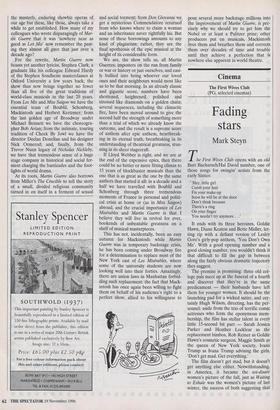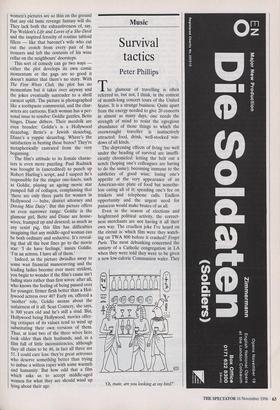Cinema
The First Wives Club (PG, selected cinemas)
Fading stars
Mark Steyn
he First Wives Club opens with an old Burt Bacharach/Hal David number, one of those songs for swingin' sexists from the early Sixties:
`Hey, little girl Comb your hair Fix your make-up Soon he will be at the door Don't think because There's a ring On your finger You needn't try anymore ...'
It ends with its three heroines, Goldie Hawn, Diane Keaton and Bette Midler, let- ting rip with a defiant version of Lesley Gore's girly-pop anthem, 'You Don't Own Me'. With a good opening number and a good closing number, you wouldn't think it that difficult to fill the gap in between along the fairly obvious dramatic trajectory they suggest.
The premise is promising: three old col- lege pals meet up at the funeral of a fourth and discover that they're in the same predicament — their husbands have left them for younger women. It should be the launching pad for a wicked satire, and cer- tainly Hugh Wilson, directing, has the per- sonnel: aside from the trio of terrific comic actresses who form the eponymous mem- bership, the film has stellar talent in every little 15-second bit part — Sarah Jessica Parker and Heather Locklear as the replacement bimbos, Rob Reiner as Goldie Hawn's cosmetic surgeon, Maggie Smith as the queen of New York society, Ivana Trump as Ivana Trump advising the girls, `Don't get mad. Get everything.'
The film doesn't get mad, but it doesn't get anything else either. Notwithstanding, in America, it became the soi-disant women's picture of the fall, just as Waiting to Exhale was the women's picture of last winter, the success of both suggesting that women's pictures are so thin on the ground that any old lame revenge fantasy will do. They lack both the exhaustiveness of, say, Fay Weldon's Life and Loves of a She-Devil and the inspired ferocity of routine tabloid fillers — like that baronet's wife who cut out the crotch from every pair of his trousers and left the contents of his wine cellar on the neighbours' doorsteps.
This sort of comedy can go two ways either the plot develops its own comic momentum or the gags are so good it doesn't matter that there's no story. With The First Wives Club, the plot has no momentum but it takes over anyway and the jokes eventually surrender to a shrill earnest uplift. The picture is photographed like a toothpaste commercial, and the char- acters are cartoons. Each woman has a per- sonal issue to resolve: Goldie guzzles, Bette binges, Diane dithers. Their menfolk are even broader: Goldie's is a Hollywood sleazebag, Bette's a Jewish sleazebag, Diane's a yuppie sleazebag. Where's the satisfaction in besting these bozos? They're metaphorically castrated from the very beginning.
The film's attitude to its female charac- ters is even more puzzling. Paul Rudnick was brought in (uncredited) to punch up Robert Harling's script, and I suspect he's responsible for the zingier one-liners, such as Goldie, playing an ageing movie star pumped full of collagen, complaining that `there are only three parts for women in Hollywood — babe, district attorney and Driving Miss Daisy'. But this picture offers an even narrower range: Goldie is the glamour girl, Bette and Diane are house- wives, frumped up and desexed; as much as any sexist pig, this film has difficulties imagining that any middle-aged woman can be both ordinary and seductive. It's reveal- ing that all the best lines go to the movie star: 'I do have feelings,' insists Goldie. `I'm an actress. I have all of them.'
Indeed, as the picture dwindles away to some wan financial manoeuvring and the leading ladies become ever more strident, you begin to wonder if the film's cause isn't fading stars rather than first wives: after all, who knows the feeling of being passed over for younger, firmer flesh better than a Hol- lywood actress over 40? Early on, offered a `mother' role, Goldie moans about the unfairness of it all: Sean Connery, she says, is 300 years old and he's still a stud. But, Hollywood being Hollywood, movies offer- ing critiques of its values tend to wind up substituting their own versions of them. Thus, at least two of the three wives here look older than their husbands, and, in a film full of little inconsistencies, although they all claim to be 46, in fact all three are 51. I could care less: they're great actresses who deserve something better than trying to imbue a witless caper with some warmth and humanity. But how odd that a film which asks us to accept middle-aged women for what they are should wind up lying about their age.



















































































 Previous page
Previous page